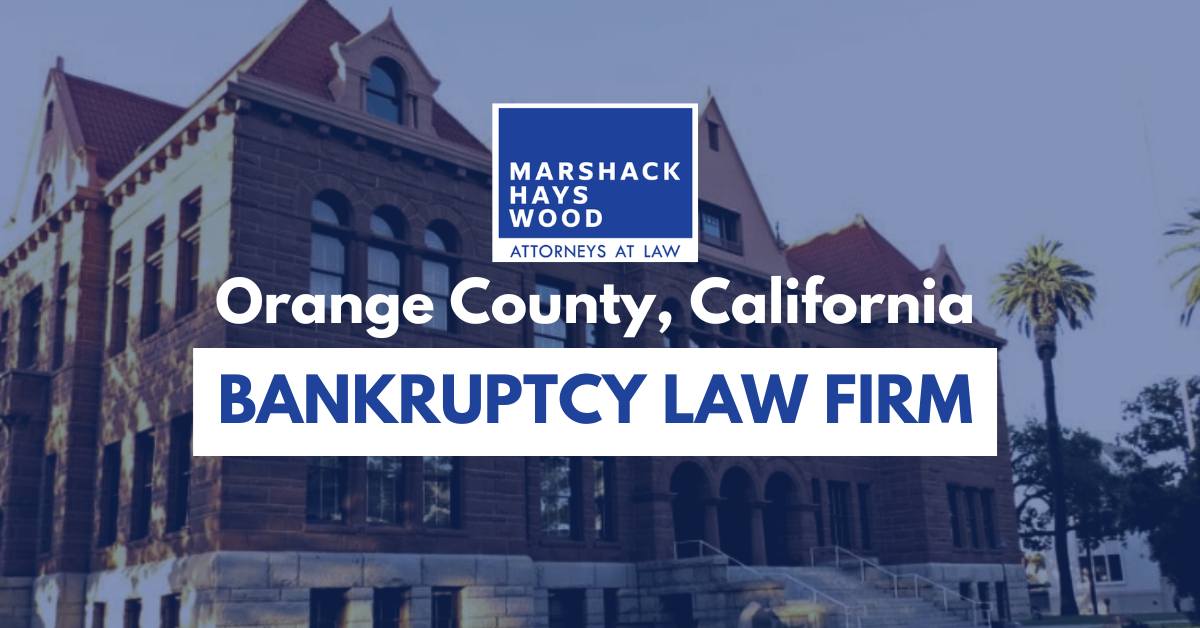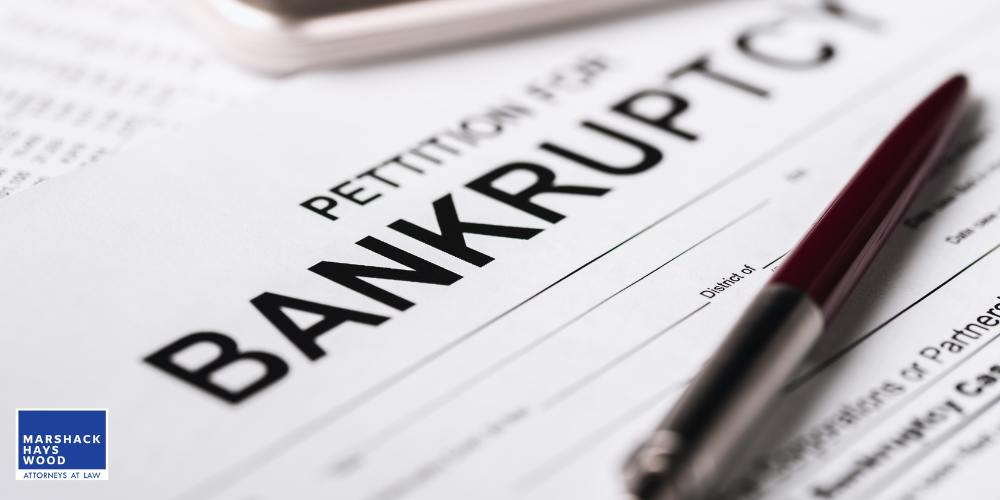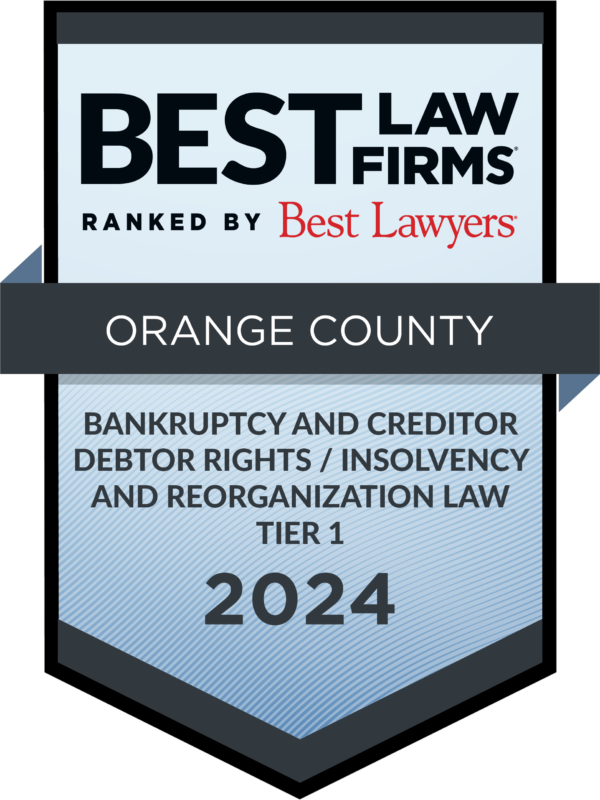Orange County Bankruptcy Attorney
Home » Practice Areas » Orange County Bankruptcy
Practice Areas
Helping Southern CA Residents Become Debt-Free With Bankruptcy Relief
No individual or business wants to fall behind on financial obligations, but in some cases, filing for bankruptcy is the most effective way to eliminate or restructure overwhelming debt. Whether you’re pursuing liquidation under Chapter 7 or reorganization under Chapter 11, bankruptcy can provide a much-needed fresh start for individuals or give businesses the time and structure they need to restore financial stability.

At Marshack Hays Wood LLP, our law firm brings over 75 years of combined bankruptcy experience to every case we take on. We help clients determine whether bankruptcy is the right step or if an alternative approach (such as debt reorganization or a financial workout) may be more suitable.
Whatever the case, our goal is to help you regain control and work toward long-term financial freedom with a carefully planned and well-executed strategy. If you’re ready to speak with an experienced Orange County bankruptcy attorney at Marshack Hays Wood about your legal options, don’t hesitate to give us a call at (949) 333-7777 or schedule your free consultation via our online contact form today.
What is Bankruptcy?
Bankruptcy is a legal process that helps individuals, businesses, and municipalities manage debt when they can no longer meet their financial obligations. A bankruptcy filing begins with a petition to the appropriate Bankruptcy Court, which then initiates the process under the authority of the federal government.
There are several different types of bankruptcy (or chapters), each with its own unique requirements and legal processes, as outlined in the U.S. Bankruptcy Code. The most common of these for individuals filing bankruptcy are Chapter 7 and Chapter 13. Depending on which chapter an individual files, they can “discharge” certain types of debt through liquidation or reorganization, allowing them to move forward and reestablish financial stability.
For businesses, bankruptcy provides an opportunity to either wind down through liquidation or continue operating while reorganizing finances under Chapter 11. Although businesses do not receive a discharge, they benefit from court protections that pause collection efforts and allow for restructuring.

What is a Bankruptcy Discharge?
A bankruptcy discharge eliminates a debtor’s personal liability for certain unsecured debts, meaning they are no longer legally required to repay them. The timing and scope of a discharge depend on the bankruptcy chapter filed, and in some cases, debtors may lose the right to a discharge altogether.
Discharge can be denied for reasons such as bad faith, hiding or fraudulently transferring assets, failing to maintain financial records, or refusing to cooperate with the bankruptcy trustee. To protect the right to a discharge, it’s essential to work with an experienced Orange County bankruptcy attorney like those at Marshack Hays Wood. Your attorney can ensure proper asset disclosures, apply available exemptions, and guide the case to avoid actions that could jeopardize relief, all while protecting your rights and helping you understand California’s bankruptcy laws.
Common Sources of Debt
Most individuals who file for bankruptcy are overwhelmed by familiar sources of debt that can quickly spiral out of control. Credit card debt is one of the most frequent problems, often driven by high interest rates and minimum payments that barely reduce the balance. Medical bill debt can also accumulate unexpectedly after a sudden illness, injury, or lack of insurance coverage. Some people struggle to pay their mortgage, especially after a job loss or other financial setback, while others face long-term pressure from student loan debt.
Bankruptcy can help address these financial burdens in different ways. In Chapter 7, eligible credit card debt and medical bills may be fully discharged, offering fast relief. Chapter 13 may allow filers to catch up on mortgage payments over time or restructure certain debts through a court-approved repayment plan. Although student loan debt is rarely discharged, bankruptcy may still provide breathing room by pausing collection efforts and freeing up income to stay current on other obligations.

Orange County Bankruptcy Cases We Handle
At Marshack Hays Wood, we represent clients in a wide range of bankruptcy matters, from individual filings to complex business reorganizations. Whether you’re considering Chapter 7 bankruptcy to eliminate unsecured debt, Chapter 13 bankruptcy to restructure payments and protect assets, or Chapter 11 bankruptcy to reorganize a business, our team provides the experienced legal guidance needed at every stage.
Chapter 7 Bankruptcy in California
Chapter 7 bankruptcy, also known as liquidation bankruptcy, allows individuals and businesses to eliminate qualifying debts by turning over non-exempt assets to a court-appointed trustee. While there are no debt limits, individual debtors must pass the “California Chapter 7 Means Test,” which evaluates income to determine eligibility.
Thanks to California’s bankruptcy exemption laws, over 95% of individuals who file Chapter 7 bankruptcy get to keep all of their property. Exemptions protect certain assets in full, such as qualifying retirement accounts, and others up to specific limits.
Most unsecured debts are dischargeable, but some cannot be eliminated. These include certain tax obligations, domestic support, debts incurred through fraud or malicious acts, and those tied to fiduciary breaches, as outlined in Section 523 of the Bankruptcy Code.
Businesses may also file Chapter 7, but with key differences: 1) they do not receive a Chapter 7 discharge, and 2) they cannot claim exemptions. To learn whether this type of bankruptcy is right for you or your company, contact an Orange County Chapter 7 bankruptcy lawyer at Marshack Hays Wood today.
Chapter 11 Bankruptcy in California
Chapter 11 bankruptcy is designed for businesses and individuals who want to keep their assets and continue operations rather than liquidate. A debtor files a reorganization plan outlining how they will repay creditors, which is then subject to creditor votes, Bankruptcy Court approval, and strict compliance with the U.S. Bankruptcy Code.
In most cases, a trustee is not appointed, allowing the debtor to manage their money and operations as a “debtor in possession.” However, creditor committees may be formed and can influence the negotiation and approval process. Because Chapter 11 plans can range from straightforward to highly complex, it’s essential to work with skilled California Chapter 11 bankruptcy attorneys who can guide you through the entire process as smoothly and efficiently as possible.
Chapter 13 Bankruptcy in California
Chapter 13 bankruptcy is a reorganization option that allows individuals and sole proprietors to repay all or part of their debts through a structured payment plan lasting three to five years. Instead of liquidating assets, debtors work with a court-appointed trustee who oversees payments, communicates with creditors, and ensures the plan is followed.
This chapter is often used by debtors who earn too much to qualify for Chapter 7 but still need meaningful relief. Chapter 13 bankruptcy also helps individuals keep their homes and may allow for the modification of certain secured debts. Because debt limits apply, those with higher income or larger debts may instead need to file under Chapter 11. Our experienced Chapter 13 bankruptcy lawyers can help determine if this option is right for your financial situation.
Small Business Bankruptcy in California
Small businesses also have the option to seek bankruptcy protection under different chapters of the Bankruptcy Code, depending on how the business is structured. In some cases, a business bankruptcy filing in California can address both business and personal liabilities, especially for sole proprietors whose obligations are closely tied to their personal finances. Partnerships, LLCs, LLPs, and corporations may also file to restructure or eliminate debt while protecting critical assets and preserving operations.
At Marshack Hays Wood, our experienced small business bankruptcy lawyers understand the financial pressure entrepreneurs face. We’re here to help you protect your money, explore practical solutions, and make strategic decisions for your company’s future.
Bankruptcy Workouts & Alternative Dispute Resolution
Our Orange County bankruptcy lawyers understand that bankruptcy isn’t always the right solution for everyone. That’s why we also offer strategic alternatives designed to help individuals and businesses regain control without filing for bankruptcy. Our experienced bankruptcy workout attorneys work to negotiate directly with creditors to reduce balances, restructure payment terms, or settle debts outside of court.
We also serve as trusted alternative dispute resolution attorneys, helping resolve complex financial conflicts efficiently and privately. For homeowners struggling to keep up with mortgage payments, our loan modification lawyers assist with adjusting loan terms to avoid foreclosure. And for clients seeking a simpler way to manage multiple obligations, we evaluate options for Orange County debt consolidation to combine debts into a more manageable single payment.
Our goal is to provide every client with practical, personalized solutions, whether that’s through bankruptcy or a well-executed alternative.

What Type of Bankruptcy is Right for Me?
Determining which type of bankruptcy filing is right for you depends on your unique financial situation. To find out if you qualify for Chapter 7 bankruptcy, you’ll need to take a means test, which evaluates your income and expenses. If you don’t qualify, Chapter 13 or Chapter 11 may be more appropriate based on your debts and goals.
In any case, the best way to protect your family and financial future is to seek trusted legal assistance from our team here at Marshack Hays Wood. We take the time to review your circumstances and clearly explain your options. We’re here to represent your interests and guide you toward the most effective path forward.
Benefits of Filing for Bankruptcy in California
- Stop Utility Shutoffs & Evictions (Temporarily)
- Stop Foreclosure Proceedings
- Stop Creditor Harassment & Collection Actions
- Stop Wage Garnishment
- Stop Lawsuits
- Start Discharging Qualifying Debt
- Start Protecting Essential Assets
- Start Creating an Affordable Repayment Plan
- Start Rebuilding Your Credit
- Start Regaining Control of Your Financial Future
Protect Yourself From Creditor Lawsuits, Wage Garnishments, & More
Filing for bankruptcy in California creates an immediate and powerful legal protection known as the automatic stay—a court order that requires creditors to stop all collection efforts. This includes actions such as creditor calls, threatening letters, pending lawsuits, wage garnishment, and even efforts to foreclose on your home. As soon as your bankruptcy petition is filed, the automatic stay takes effect, allowing you to take control of your financial situation without ongoing harassment or legal pressure.

Whether you’re trying to stop creditor harassment, avoid foreclosure, or put a hold on lawsuits that could impact your wages or property, bankruptcy can give you the relief you need. It doesn’t erase all debts instantly, but it pauses the chaos and gives you time to evaluate your options and create a plan to pay what you can under the protection of the law.
What is Bankruptcy Litigation?
Bankruptcy litigationa encompasses disputes arising from, or connected with, a bankruptcy proceeding. Such disputes can involve businesses, individuals, government agencies, or organized groups. The attorneys at Marshack Hays Wood represent clients in all aspects of bankruptcy litigation.
Common Examples of Bankruptcy Litigation
- Preferential Transfer Lawsuits
- Fraudulent Transfer Lawsuits
- Dischargeability Lawsuits
- Objections to Plan
- Cash Collateral Disputes
- Lien-Priority Disputes
- Lien-Stripping Disputes
- Proof of Claim or Objections to Claim

Filing a Bankruptcy Petition in Orange County
Filing a bankruptcy petition in Orange County, California begins with an initial consultation to review your debts, assets, and financial goals. After determining the best path forward, you’ll complete a required credit counseling session through a U.S. Trustee-approved agency. Your attorney will then prepare and file the bankruptcy petition with the local bankruptcy court (located in Santa Ana), triggering an automatic stay.
Once the petition is filed, a trustee is appointed to oversee your case. You’ll need to attend a 341 meeting of creditors, where you’ll answer questions about your finances under oath. To finalize the process, you must complete a post-filing debtor education course. In a Chapter 7 case, discharge typically occurs within three to four months. The Chapter 13 bankruptcy timeline is a bit different – you’ll receive a Chapter 13 discharge after completing a 3 to 5-year payment plan.
How Much Does It Cost to File Bankruptcy in Orange County?
Although it may sound counterintuitive, it does cost a certain amount of money to file bankruptcy no matter where you file. In California, the general cost to file Chapter 7 is $338, while Chapter 13 costs $313. But what happens when you cannot afford to pay even this amount? In these cases, you can apply for a fee waiver or arrange to pay the fee in installments.
Will I Lose My Home if I File for Bankruptcy?
Filing for bankruptcy does not automatically mean you will lose your home. In many cases, California’s generous homestead exemption protects your equity, especially in Chapter 13, which allows you to catch up on missed mortgage payments through a structured repayment plan.
Understanding the California Homestead Exemption
California’s homestead exemption helps protect a homeowner’s home equity when filing for bankruptcy under the two systems or “sections” of bankruptcy exemptions offered by the state. Section 704 Exemptions provide a significantly higher homestead exemption (between $361,076 and $722,507, depending on your area’s average property value) than Section 703 Exemptions (up to $36,750). As such, Section 703 is typically a better fit for those who don’t own property or who have little home equity.

Do I Need to Hire a Bankruptcy Lawyer?
Although you are not required to hire a bankruptcy lawyer, we strongly recommend doing so. Attempting to tackle a complicated bankruptcy case on your own can be extremely difficult, especially if you have no experience with these cases. Even small mistakes or missed deadlines could lead to the dismissal of your case. Working with a local Orange County bankruptcy attorney will ensure that you do not miss any filing deadlines, fill out your paperwork properly, and that you adhere to all local, state, and federal laws.
Why Make Marshack Hays Wood Your Orange County Bankruptcy Law Firm?
Many residents in Orange County and throughout the SoCal region turn to Marshack Hays Wood for trusted legal guidance during some of life’s most difficult financial moments. Why? As experienced Orange County bankruptcy lawyers, our team offers personalized strategies backed by decades of success in consumer and business bankruptcy cases. Whether you’re facing foreclosure, overwhelming debt, or complex creditor disputes, a knowledgeable bankruptcy attorney at our firm will help you make informed decisions and pursue the most effective path toward a stress-free life after bankruptcy.
Serving Orange County & the Surrounding Southern California Communities
As a leading Orange County bankruptcy law firm, Marshack Hays Wood proudly serves clients across every community in the region. Though our law offices are based in Irvine, CA, we provide trusted bankruptcy representation to individuals and businesses from Santa Ana and Huntington Beach to Costa Mesa and Anaheim. We also regularly work with clients in cities like Laguna Beach, Laguna Hills, San Juan Capistrano, San Clemente, Newport Beach, Mission Viejo, Lake Forest, Fountain Valley, Buena Park, Fullerton, Aliso Viejo, Dana Point, Rancho Santa Margarita, Seal Beach, Los Alamitos, Villa Park, Laguna Woods, and beyond.

Ready for a Fresh Start? Contact Our Orange County Bankruptcy Attorneys for a Free Consultation Today
If you’re overwhelmed by debt and unsure where to turn, contact an Orange County bankruptcy attorney at Marshack Hays Wood right away. Our experienced legal team offers clear guidance and proven strategies to help you pursue meaningful bankruptcy relief and regain financial control.
With a conveniently located bankruptcy law firm in Irvine, CA, and a reputation built on trust and results, we’re ready to stand by your side. Contact us today by calling (949) 333-7777 or reach out online to schedule a free consultation and take the first step toward a stronger financial future.
Disclaimer: This content is for informational purposes only and does not constitute legal advice or establish an attorney-client relationship. For legal guidance tailored to your specific situation, please speak directly with an Orange County bankruptcy attorney on our team today.
READY TO GET STARTED?
At Marshack Hays Wood, our attorneys provide the legal support you need to move forward with confidence. Let us help you take the first step toward financial stability.


